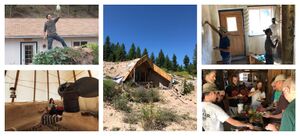
"SKIP" or Skills to Inherit Property is a program developed by permaculture advocate Paul Wheaton of Wheaton Labs in Missoula, Montana. It is intended to provide a method by which people who want to own land but cannot afford it to connect with elderly land owners who have the land, but no one to bequeath it to. This could be from not having had children, or children who are not interested in carrying on the farming or homesteading legacy.
Background[edit | edit source]
Millions of people are blocked from homesteading because of the sheer expense of getting started. And millions of elderly people are frustrated that they cannot find somebody worthy to pass their homestead to. Every year hundreds of thousands of homesteads are abandoned - with the government taking possession about half the time. Or their heirs sell the land in an estate sale or auction and developers buy it and convert the place into another commercial strip mall or housing development.
Millions of older folks are facing thees choices. They don’t want all the beautiful things they’ve lovingly created by hand to be bulldozed in the pursuit of earning a quick buck. Other homesteaders and farmers may need good interns or helpers. They may want to share their property in exchange for a little help around the place. Older folks without land may just want to bequeath “homestead start-up capital” to participants they’ve taken a shine to. Other homestead owners are looking for land managers or caretakers. Or some sort of collaboration. But their efforts have led to horrific results from dishonest or even criminal people - so their homesteads are, effectively abandoned.
Millions of young people are facing the choices associated with college, debt and a 50 hour work week for the next five decades. They want to do something productive with their lives that aligns with sustainability and the environment. They really want to work on the land and have a homestead of their very own.
People with homesteads are seeking people with real experience and skill.
People seeking homesteading opportunities want to build real experience and skill.
Wheaton gives a summary explanation of SKIP here.
The Program[edit | edit source]
People seeking homesteading opportunities are provided a way to accomplish hundreds of things and document them for free (the documentation is necessary so as to prove one's SKIP credentials. Eventually, they will be able to peruse hundreds of homestead opportunities. And people with homesteads will be able to peruse hundreds of homesteaders that have proven their worth.
Active homesteaders use SKIP to build their skills for their own benefit. The verification of their skills lends weight to their words on our forums. Some people already have land and use SKIP to build their skills for caring for their land.
Matching aspiring homesteaders with retiring farmers has always been an impossible struggle. SKIP intend to alleviate that struggle It’s a lengthy and detailed curriculum of skills for which people can be certified. Advancing through the levels shows the kind of dedication that older farmers and homesteaders will appreciate and reward.
PEP[edit | edit source]
Permaculture Experience according to Paul Wheaton is a more formal approach to learning homesteading and permaculture. It is a curriculum and certification to show that you have learned--and have--homesteading and permaculture skills. It is a way to learn through doing. As one learns and has their skills certified, they earn the credentials needed to demonstrate their progress in achieving competency in homesteading.
PEA[edit | edit source]
PEA: Permaculture Experience for Apartments is a modified version of the SKIP credentials earning program designed for apartment dwellers. Focusing on the tools and experiences they have access to, it involves container gardening, basic tool care, community living, food preparation and preservation, greywater, commerce, and miscellaneous other such things that can be eventually attributed to homestead living. This can get one started on developing credentials and assessing interest, leading to eventual participation in more hands-on work perhaps at a nearby farm or homestead.
References[edit | edit source]
See also[edit | edit source]
- All about SKIP
- SKIP: Skills to Inherit Property event - Wheaton Labs
- Chats with the SKIP cook about organic food at the event